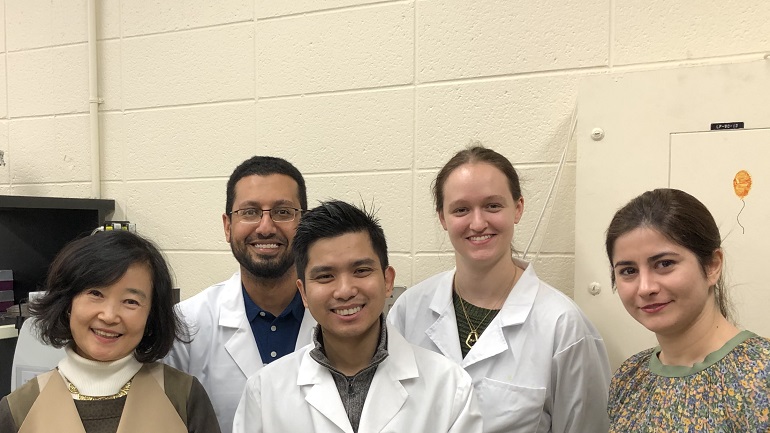
The National Cancer Institute has awarded the Wayne State University School of Medicine $3,032,353 over five years to fund a study that holds the potential to introduce a new class of drugs tailored for patients with therapy-resistant cancers.
Professor of Pathology Hyeong-Reh Kim, Ph.D., is the principal investigator on the project, “A novel AR degrader in castrate-resistant prostate cancer.”
The goal is to develop a new class of drugs that effectively degrade both wild-type androgen receptor (AR) proteins and AR variants in prostate cancer. The Kim laboratory has been working to uncover the molecular and cellular mechanisms underlying human cancer progression and metastasis, to identify therapeutic targets and to develop novel therapeutics for patients with therapy-resistant cancers, including advanced head and neck cancers and castrate-resistant metastatic prostate cancer.
The receptors for androgens, the group of male sex hormones, play a critical role in all stages of prostate cancer. While many prostate cancer patients initially respond to hormone therapies, significant numbers of patients develop castrate-resistant prostate cancer.
Clinical studies have shown that castrate-resistant prostate cancer often involves androgen receptor variants that lack the ligand binding domain, making this hormone receptor constitutively active and resistant to hormone therapy.
“The innovations in our study include the development of a new therapeutic platform using autophagy-targeting chimera (AUTOTAC) for oncoprotein degradation,” she said. “This novel therapeutic platform is composed of a target-binding small molecule linked to an autophagy ligand. The AUTOTAC brings the targeted oncoprotein to the protein degradation machinery, involving autophagosome and lysosome, leading to the efficient removal of oncoproteins.”
“Using a natural ligand or a synthetic small molecule that binds the protein of interest, the AUTOTAC can be utilized for the removal of unwanted proteins. Our study will help establish the foundation for a revolutionary drug development platform in a wide array of human diseases,” Dr. Kim added.
In collaboration with Radiation Oncology Professor Harold Kim, M.D., and Associate Professor Joseph Rakowski, Ph.D., and the new Barber Integrative Metabolic Research Team, the Kim laboratory is engaged in the development of radiosensitizers utilizing the AUTOTAC platform or inducers of lipolysis.
“This is a truly collaborative project involving many co-investigators, including Dr. Yong Tae Kwon at Seoul National University; and Drs. Elisabeth Heath (Oncology), Seongho Kim (Oncology), Dongping Shi (Pathology), Michael Cher (Urology), Lisa Polin (Oncology) and Sijana Dzinic (Oncology) at the Wayne State University School of Medicine. In my laboratory, Drs. Abdo Najy and Tri Pham, Alaleh Zamiri, M.D. – a Ph.D. student – and Jenna Poole will work on this project. We hope to recruit more student and post-doctoral fellows to work on this project,” Dr. Kim said.
The number for this National Institute of Health award is R01CA282040.